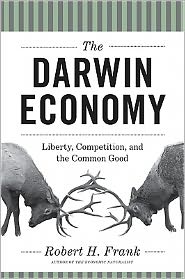 include The Winner-Take-All Society (with Philip Cook), The Economic Naturalist, Luxury Fever, What Price the Moral High Ground?, and Principles of Economics (with Ben Bernanke).
include The Winner-Take-All Society (with Philip Cook), The Economic Naturalist, Luxury Fever, What Price the Moral High Ground?, and Principles of Economics (with Ben Bernanke).Frank applied the “Page 99 Test” to his new book, The Darwin Economy: Liberty, Competition, and the Common Good, and reported the following:
Page 99 of The Darwin Economy is the last page of chapter 6 and has only a few lines of text. So rather than cherry-pick some other page to write about, what follows is a brief description of one of the main ideas in the book.Learn more about the book and author at Robert H. Frank's website.
Conservatives cite Adam Smith’s invisible hand theory, which says that unregulated markets channel self-interest for the common good. We could all do better, they say, if we pushed government aside and let markets work their magic. Liberals counter that markets aren’t truly competitive. We need extensive regulation, they insist, to prevent exploitation by powerful elites.
Here the impulse to assume that the truth lies somewhere in between is misguided. Markets are far more competitive than ever, just as conservatives claim, but they’re also dramatically more wasteful.
That’s because market failure stems not from any shortfall of competition, but from the very logic of competition itself. As the pioneering naturalist Charles Darwin saw clearly, individual and group interests sometimes coincide, as in Smith’s framework. But often they diverge sharply, and in those cases, competition not only fails to promote the common good, it actively undermines it.
Consider the massive antlers of bull elk—which often span four feet and weigh more than 40 pounds. Bull elk, like most vertebrate males, take more than one mate if they can. But if some succeed, others are left with none, making them the ultimate losers in the Darwinian tournament. So bulls fought bitterly for females, and because relative antler size was often decisive, an arms race in antlers ensued. Bulls as a group would fare better if their antlers were all smaller by half, since the outcome of each fight would be the same, and the added mobility would help them evade predators. Yet any individual with relatively small antlers wouldn’t win a mate.
Similar conflicts spawn wasteful arms races in the marketplace. If you’re one of several qualified applicants seeking the same investment-banking job, you want to look good during your interview. But looking good is a relative concept. If others wear $500 suits, you’ll be more likely to get a callback if you wear one costing $2,000.
These incentives create a wasteful arms race, because job applicants are no more likely to get the positions they seek when all spend more. But from each individual’s perspective, that’s no reason to regret having bought the more expensive suit.
As Darwin understood, non-human animals could do little to discourage such wasteful behavior. But humans have better options. Simple, unintrusive steps could liberate literally trillions of dollars of additional resources each year. All citizens could pursue their own visions of the good life more fully with no need for painful sacrifices from anyone. These claims evoke the alchemist’s promise to turn lead into gold. But as I explain in The Darwin Economy, they rest on sound logic and compelling evidence.
Writers Read: Robert H. Frank (July 2007).
Writers Read: Robert H. Frank (October 2011).
--Marshal Zeringue